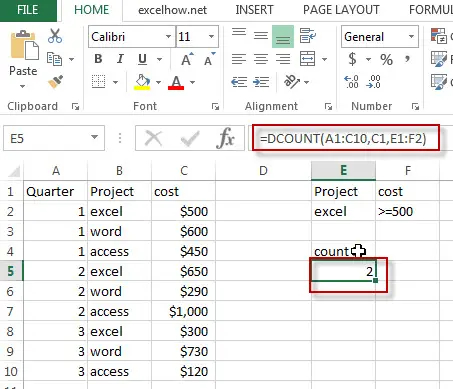This post will guide you how to use Excel DCOUNT function with syntax and examples in Microsoft excel.
Table of Contents
Description
The Excel DCOUNT function returns the number of cells that containing numbers in a column of a list or a database that match the conditions that you specify.
The DCOUNT function is a build-in function in Microsoft Excel and it is categorized as a Database Function.
The DCOUNT function is available in Excel 2016, Excel 2013, Excel 2010, Excel 2007, Excel 2003, Excel XP, Excel 2000, Excel 2011 for Mac.
Syntax
The syntax of the DCOUNT function is as below:
= DCOUNT (database, field, criteria)
Where the DCOUNT function arguments are:
- Database -This is a required argument. The range of cells that containing the database.
- Field – This is a required argument. The column to count the values.
- Criteria – The range of cells that contains the conditions that you specify.
Excel DCOUNT Function Examples
The below examples will show you how to use Excel DCOUNT Function to count the cells that contain numbers in a column of a list or database that match a given criteria.
#1 =DCOUNT(A1:C10,C1,E1:F2)

Note: The above excel formula will find excel project and counts how many of the cost fields in those records contains numbers.
Related Functions
- Excel DcountA Function
The Excel DCOUNTA function returns the number of cells that containing nonblank values in a column of a list or a database that match the conditions that you specify.The syntax of the DCOUNTA function is as below:= DCOUNTA (database, field, criteria)…
Leave a Reply
You must be logged in to post a comment.